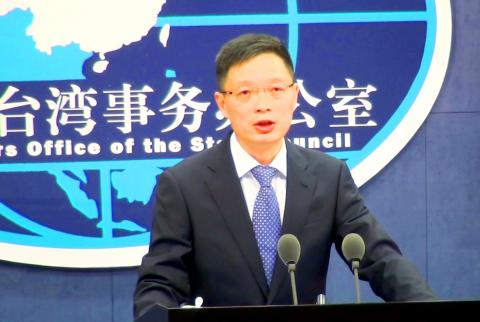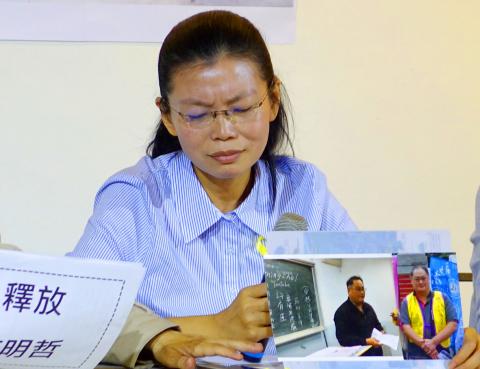Lee Ching-yu (李凈瑜), the wife of detained human rights advocate Lee Ming-che (李明哲), said remarks by China’s Taiwan Affairs Office (TAO) substantiated an accusation that Beijing has its compradors in the Chinese Nationalist Party (KMT), after the office yesterday confirmed that it had commissioned a third party to “relate the relevant situation” to Lee Ching-yu and pass letters from Lee Ming-che to her and his parents, while warning other groups not to intervene in the case.
Outside intervention would complicate matters and harm already tense relations between Taipei and Beijing, the office said.
TAO spokesman An Fengshan (安峰山) said that China had passed letters from Lee Ming-che, who is under investigation for endangering China’s national security, to his wife and parents.

Photo: CNA
On Monday, Lee’s wife was prevented from flying to Beijing to seek a meeting with her husband when China canceled her travel permit.
An told reporters at a news conference in Beijing that authorities were protecting the legal rights of Lee Ming-che, who was taken into custody on March 19, but added that he had no other information about the case.
However, An said outside interference would “only render the issue even more complicated and harm the interests of the person concerned.”

Photo: Wang Yi-sung, Taipei Times
“A few Taiwanese people and groups with ulterior motives who are seizing this opportunity to attack the mainland are doomed to failure. They will not achieve their goal of interfering in the work of the relevant mainland departments in handling the case by law,” An said.
An also warned against “attempts by the Taiwanese authorities to use the incident to attack the mainland,” saying that “would only make the already extremely grim cross-strait relationship even worse.”
Lee Ching-yu said in a statement that Lee Chun-min (李俊敏), a third-party broker, had told her that her husband’s arrest was the result of Chinese security services “missing their mark” — arresting the “wrong person” due to pressure to show results in enforcing a law regulating non-governmental organizations.
She quoted him as saying that her husband’s detention was a “bad case,” as cross-strait relations are sensitive, and added that there was tension between Chinese security forces and the TAO over how to proceed.
“This case is the result of Guangdong’s national defense department ‘hitting the gas pedal,’ which is related to conflicts between the [Chinese] Ministry of State Security and the TAO that we have seen in the past,” she quoted him as saying.
“If [Lee Chun-min] has been commissioned by the Association for Relations Across the Taiwan Straits, this amounts to an acknowledgement that they have arrested the wrong person,” Lee Ching-yu said. “As they were afraid that the central government in Beijing would find out about the mistake, they sent Lee Chun-min to contain the issue by threatening, intimidating and cajoling me into not going to Beijing to reveal the truth — that is the real reason my travel permit was canceled.”
Lee Chun-min told Lee Ching-yu that he was an assistant to KMT Legislator Lai Shyh-bao (賴士葆), she said, accusing the KMT of selling out the nation as “China’s compradors in Taiwan.”
Lee Ching-yu said her husband has hypertension and she has attempted to have medication sent to him.
Additional reporting by Abraham Gerber

MAKING WAVES: China’s maritime militia could become a nontraditional threat in war, clogging up shipping lanes to prevent US or Japanese intervention, a report said About 1,900 Chinese ships flying flags of convenience and fishing vessels that participated in China’s military exercises around Taiwan last month and in January last year have been listed for monitoring, Coast Guard Administration (CGA) Deputy Director-General Hsieh Ching-chin (謝慶欽) said yesterday. Following amendments to the Commercial Port Act (商港法) and the Law of Ships (船舶法) last month, the CGA can designate possible berthing areas or deny ports of call for vessels suspected of loitering around areas where undersea cables can be accessed, Oceans Affairs Council Minister Kuan Bi-ling (管碧玲) said. The list of suspected ships, originally 300, had risen to about

DAREDEVIL: Honnold said it had always been a dream of his to climb Taipei 101, while a Netflix producer said the skyscraper was ‘a real icon of this country’ US climber Alex Honnold yesterday took on Taiwan’s tallest building, becoming the first person to scale Taipei 101 without a rope, harness or safety net. Hundreds of spectators gathered at the base of the 101-story skyscraper to watch Honnold, 40, embark on his daredevil feat, which was also broadcast live on Netflix. Dressed in a red T-shirt and yellow custom-made climbing shoes, Honnold swiftly moved up the southeast face of the glass and steel building. At one point, he stepped onto a platform midway up to wave down at fans and onlookers who were taking photos. People watching from inside

Japan’s strategic alliance with the US would collapse if Tokyo were to turn away from a conflict in Taiwan, Japanese Prime Minister Sanae Takaichi said yesterday, but distanced herself from previous comments that suggested a possible military response in such an event. Takaichi expressed her latest views on a nationally broadcast TV program late on Monday, where an opposition party leader criticized her for igniting tensions with China with the earlier remarks. Ties between Japan and China have sunk to the worst level in years after Takaichi said in November that a hypothetical Chinese attack on Taiwan could bring about a Japanese

The WHO ignored early COVID-19 warnings from Taiwan, US Deputy Secretary of Health and Human Services Jim O’Neill said on Friday, as part of justification for Washington withdrawing from the global health body. US Secretary of State Marco Rubio on Thursday said that the US was pulling out of the UN agency, as it failed to fulfill its responsibilities during the COVID-19 pandemic. The WHO “ignored early COVID warnings from Taiwan in 2019 by pretending Taiwan did not exist, O’Neill wrote on X on Friday, Taiwan time. “It ignored rigorous science and promoted lockdowns.” The US will “continue international coordination on infectious